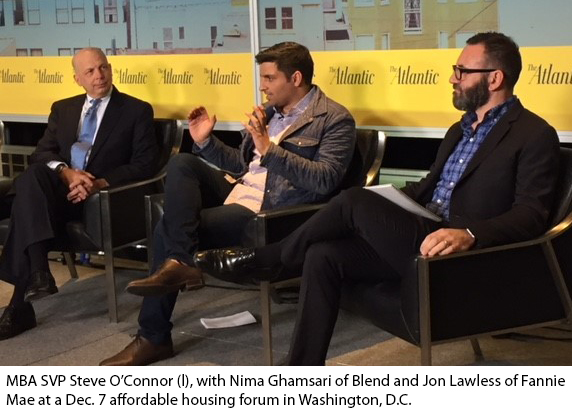
MBA-Sponsored Forum Examines Affordable Housing Issues
WASHINGTON–At an affordable housing forum here last week, the Mortgage Bankers Association made its case for comprehensive housing reform.
The Dec. 7 forum, From Houses to High-Rises, a Question of Affordability, sponsored by The Atlantic with support from MBA, examined a number of affordable housing issues. Nela Richardson, chief economist with Redfin, Seattle, noted part of the problem is low housing inventories at all levels, driving up home prices and threatening affordability.
 “This is a market like we’ve never seen before,” Richardson said. “The pressure we’re seeing at the top of the funnel is really playing out in the affordable housing market.”
“This is a market like we’ve never seen before,” Richardson said. “The pressure we’re seeing at the top of the funnel is really playing out in the affordable housing market.”
With home prices growing at a 7 percent pace, Richardson said, and no sign of abating, wages are not keeping up. “Many middle-class people are being priced out of the market,” she said. “You can’t keep up in a market when cash is king.”
Sen. Maria Cantwell, D-Wash., said the tax bill recently passed by the Senate effectively hampers affordable housing initiatives, noting the House bill discourages bond programs that support affordable housing projects. “We are in a crisis state right now,” she said. “We need affordable housing tax credits.”
Steve O’Connor, MBA Senior Vice President of Public Policy and Industry Relations, said regulatory barriers continue to stunt the real estate finance industry. “In many cases, you’ve seen an over-correction in regulatory rules that have stifled innovation,” he said.
O’Connor said one of the most fixable problems in resolving housing is the “knowledge gap.”
“There are a lot of people who can afford to own a home right now, but they don’t know it,” O’Connor said. “We’re working with realtors and other in getting them access.”
Key to this, O’Connor added, is recreating the secondary mortgage market. Earlier this year MBA released a white paper, GSE Reform: Creating a Sustainable, More Vibrant Secondary Mortgage Market (https://www.mba.org/issues/gse-reform).
The paper presents MBA’s recommended approach to GSE reform, which MBA calls “the last piece of unfinished business from the 2008 financial crisis.” It outlines key principles and guardrails that should guide the reform effort and provides a detailed picture of a new secondary-market end state. It also attempts to shed light on two critical areas that have tested past reform efforts–the appropriate transition to the post-GSE system and the role of the secondary market in advancing an affordable housing strategy.
“Much of our plan deals with affordable housing and access to credit,” O’Connor said. “You have to coordinate the GSEs with other stakeholders so that you’re not simply redistributing, but expanding housing opportunities.”
Jon Lawless, Vice President of Product Development and Affordable Housing with Fannie Mae, Washington, D.C., said five years from now, the Millennial generation will be buying homes in force.
“We have to prepare now, or else the housing shortage now will be a housing crisis,” Lawless said. “Homeownership should not be something only rich people do.”
